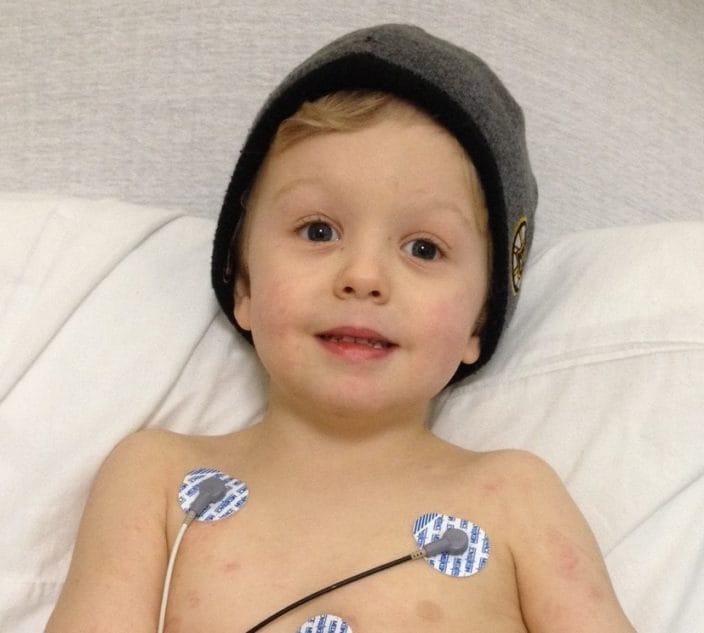 Photo: Thinkstock
Photo: Thinkstock My friend Melanie* was traumatized by her son Nick’s reaction to a peanut butter cookie at 18 months. Although the allergist never recommended it, they began completely avoiding activities like birthday parties, football games and visiting relatives.
Melanie even hired a sitter when she went to the grocery store to keep her son from entering an aisle with peanuts.
By third grade, Nick was an anxious little fellow, yet he hated feeling isolated at the peanut-free table. The allergist suggested a challenge to see if Nick would react to peanut contact or inhalation. But when the doctor brought a closed jar of peanut butter into the examination room, the terrified boy hid under the table.
After coaxing and reassurance, Nick reluctantly came out and passed the challenges; he had no reaction to peanut proteins in the air or on his skin. Nick was still allergic and had to avoid eating peanuts, even traces. But the allergist said the extreme level of avoiding went beyond what Nick required.
Coping by Avoiding
Melanie’s vigilance is an example of what psychologists call “avoidance coping”. Rather than working through ways to make situations safe for Nick, she simply shunned them. This limiting behavior can initially provide a feeling of safety. But in the long term, it affects quality of life and perpetuates anxiety.
It’s true that not every event is a good idea when coping with food allergies. For example, a dairy farm field trip may be too risky for a child with a severe milk allergy. But if you’re avoiding whole categories of activities, ask yourself: “Is this avoidance truly in the best interest of my child?”
Use the following tips to assess the situation and push past boundaries when unwarranted anxiousness is the only thing holding you and your child back.
1. Think outside the box.
When you’re tempted to say “no” to an activity because it makes you anxious, challenge yourself to find a way to make it work. Perhaps it’s not if your child can go trick-or-treating but how. Could he wear gloves? Could he collect the candy and then trade his loot for safe treats?
2. Don’t confuse possible with probable.
There are about 32 million Americans living with food allergies – traveling, eating at restaurants, going to school and to work. Life-threatening reactions are rare, so focus on what is likely to happen (your child will be just fine with precautions) rather than what could happen.
3. Start small.
If you’re too apprehensive to trust a sitter for an evening, have a close friend watch your child for 30 minutes while you run a quick errand. The more you expose yourself to a frightening situation, the less afraid you will become.
4. Be brave.
I used to feel a bit uneasy when my son had a sleepover at his friend’s house, even after he’d been doing this safely for years. I reminded myself that just because I felt scared did not mean he was in danger. It was up to me to learn to tolerate my feelings and let my son experience life.
5. Look for shades of gray.
I’ve worked with parents who make black-and-white decisions, such as “we don’t visit relatives” or “we never eat at restaurants”. While these strict choices may lower stress in the short term, they can leave your child longing for a taste of “normal” life. Consider finding a safe middle ground. Is there one relative who would be sensitive to your child’s needs? Can you find even one restaurant that could accommodate your child?
6. Get back on the horse.
It’s tempting to tighten the reins if your child has a serious reaction. After my son experienced anaphylaxis in kindergarten, the scared part of me wanted to keep him home until he was 20! Still, I knew the best thing for him and for me would be for things to get back to normal as soon as possible.
7. Picture a happy ending.
If I get nervous when my son is out and about, or a scary scenario pops into my mind, I switch over to the reality of how much fun he is having and how happily exhausted he will be after a day with friends.
Like candles, kitchen knives and household cleaners, our kids can be around potentially dangerous things when they are taught how to do so safely. Luckily this is a lesson that Melanie and Nick learned very well. Although Nick has not outgrown any of his allergies, he has now confidently headed off to college on his own.
*Names changed for privacy.
Allergic Living contributor Gina Clowes is a certified master life coach, who specializes in the needs of parents of children with food allergies. She is the founder of AllergyMoms.com, an online support group serving thousands of families worldwide.
Read more from Gina Clowes:
Ages and Stages of Food Allergy Management
7 Ways to Resolve Food Allergy Issues with Family and Friends
7 Party Tips for Allergy Safe Celebrations





